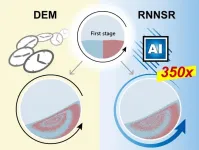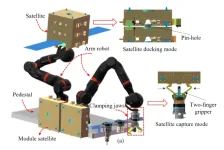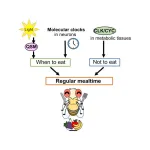(Press-News.org) A McLean Hospital study of 598 people across various industries who underwent a two-day training workshop where they learned about trauma-informed care and how to deploy these skills within their organizations, found participants reported significant gains in knowledge of trauma and made improvements to organizational policies, according to a comparison of survey data collected before and after the trainings.
Among those trained, who included nurses, CEOs, academics and corrections officers, post-survey scores increased significantly in four out of five survey measures including self-assessed knowledge and attitudes about trauma, systemwide knowledge and attitudes, awareness of cultural background at work, and skills of training and coaching staff to sustainably build the conditions for safety and mattering.
The study, led by Alisha Moreland-Capuia, MD, director of McLean's Institute for Trauma-Informed Systems Change, published online October 30 in The Journal of Clinical Psychiatry. Dr. Moreland-Capuia designed the “Training for Change” workshops included in the study.
“Because trauma is everywhere and experienced widely, trauma and healing must be everyone’s business,” said Moreland-Capuia, who also serves as director of Trauma-Informed Treatment, Consultation, and Outreach for the Division of Depression and Anxiety Disorders at McLean, and assistant professor of psychiatry at Harvard Medical School. “Our workshops equip individuals and organizations with the necessary tools for creating and codifying safety, mattering and healing."
Trauma-informed care is an approach that considers the trauma that an individual may have experienced or still be experiencing and offers training and education to facilitate healing and empowerment. An estimated 70 percent of the global population and two-thirds of Americans have experienced at least one traumatic event in their lifetimes.
Moreland-Capuia has dedicated her career to bringing trauma-informed care practices to systems rather than just individuals, to raise organizational awareness and introduce policies and procedures that can avoid retraumatizing individuals and provide them the support and a positive environment needed to thrive. Through her institute, she has conducted trainings with individuals in organizations ranging from small nonprofits to Fortune 500 companies, the criminal justice system, healthcare and academia settings, and local and international political leaders.
Study participants who underwent a two-day “Training for Change” workshop participated in didactic sessions where they learned about cultural responsivity, the biological effects of trauma on the brain and body, and what trauma-informed care is how it can be deployed within an organization. They also brainstormed trauma-specific practices to apply to their respective organizations in smaller breakout groups.
The researchers provided surveys to workshop participants before undergoing the training, and again six months later. These surveys had been validated in previous research studies led by Moreland-Capuia as outcome measures that quantify-trauma informed change in individuals’ knowledge and attitudes, as well as in system-wide changes.
The researchers found that while there was a significant increase in scores in four out of the five scales the survey measured, there was not an increase in safety and acceptance at work. Moreland-Capuia notes that research suggests organizational change could take as long as 18 months and suspects such measures might increase with more time. Future studies will look to track participants longer-term to better understand and quantify how the workshops might affect lasting changes and would also look to include larger numbers of individuals from diverse backgrounds and roles within organizations.
Study limitations include the analysis was done only on those who responded to the 6-month surveys, who might have positive views of their organization. For example, a company CEO may be more likely to enact changes rapidly, or a 10-person company could make wholescale changes easier than a 10,000-person company. The researchers added that the majority of those trained were college-educated white women, and for an organization to be trauma-informed, the whole workplace needs to be included.
“Trauma has a profound impact on the daily lives and interactions of those who have experienced it, which is why it is crucial that all systems, from workplaces to health care to civic and criminal justice settings, operate with trauma-informed care practices top of mind,” said Kerry J. Ressler, MD, PhD, Chief Scientific Officer and chief of the Division of Depression and Anxiety Disorders at McLean Hospital. “This research provides meaningful data that support that educating members of an organization on trauma-informed care could lead to transformational changes in attitudes and policies, which ultimately may benefit everyone within a given system.” added Ressler, who is also director of McLean’s Neurobiology of Fear Laboratory and a professor of psychiatry at Harvard Medical School.
Funding: The study was by the Center for Excellence in Anxiety and Depressive Disorders at McLean.
Disclosures: Dr Moreland-Capuia discloses she receives royalties from two Springer Nature publications to include: “Training for Change” and “The Trauma of Racism.” A full list of author disclosures can be found in the paper.
About McLean:
McLean Hospital has a continuous commitment to put people first in patient care, innovation and discovery, and shared knowledge related to mental health. It is consistently named the #1 freestanding psychiatric hospital in the United States by U.S. News & World Report, and is #1 in America for psychiatric care in 2023-24. McLean Hospital is the largest psychiatric affiliate of Harvard Medical School and a member of Mass General Brigham. To stay up to date on McLean, follow us on Facebook, YouTube, and LinkedIn.
END
Trauma-informed training workshops prompt meaningful individual and organizational changes, according to outcomes surveys
Nearly 600 individuals trained in a two-day trauma-informed care course reported improvements in competencies related to knowledge and cultural awareness, and reported positive changes to organizational policies
2023-10-30
ELSE PRESS RELEASES FROM THIS DATE:
Study of 1,000 selfies helps explain how we use them to communicate
2023-10-30
People have used self-portraits to communicate information about themselves for centuries — and digital cameras make it easier to share a self-portrait than ever before. But even though selfies are now almost ubiquitous, we don’t understand how people use them to communicate. So scientists from the University of Bamberg set out to investigate the semantics of selfies.
“Although the term ‘selfies’ is now celebrating its 21st birthday, and although selfies are known in art history for nearly 200 years in photography and more than 500 years in paintings, we still lack a clear classification of the different types of selfies,” ...
Powder engineering adds AI to the mix
2023-10-30
Imagine a world without powders. It may sound exaggerated, but our daily lives are intricately connected to powders in various ways from foods, pharmaceuticals, cosmetics to batteries, ceramics, etc. In all these industries, powder mixing is an important unit operation where different types of powders are mixed to achieve uniformity. However, it can be difficult to predict what conditions are optimal to achieve the desired uniformity as the process often relies on trial and error as well as engineers’ expertise.
Numerical ...
Risk of admission and death from COVID-19 low overall, but oldest adults remain vulnerable
2023-10-30
About 80% of residents in the Lower Mainland, British Columbia, had been infected with SARS-CoV-2 by July 2023 and were at low risk for severe outcomes, but almost half of the oldest adults remained uninfected and were at highest risk of hospitalization and death due to COVID-19, according to a new study published in CMAJ (Canadian Medical Association Journal) https://www.cmaj.ca/lookup/doi/10.1503/cmaj.230721.
The findings underscore the need to continue prioritizing older adults for COVID-19 vaccination.
"First-ever SARS-CoV-2 infections among older adults may still contribute substantial COVID-19 burden, reinforcing ...
High engagement, high return: The secret to student success
2023-10-29
High engagement, high return. That’s the advice from education experts at the University of South Australia for teachers looking to improve student outcomes.
In a new study conducted in partnership with Flinders University and Melbourne Graduate School of Education, researchers found that less than a third of teachers are engaging students in complex learning, limiting student opportunities for building critical thinking and problem solving.
Filming and assessing* the content of classrooms ...
Robot space maintenance based on human arm dynamics
2023-10-28
On-orbit assembly has become a crucial aspect of space operations, where the manipulator frequently and directly interacts with objects in a complex assembly process. The traditional manipulator control has limitations in adapting to diverse assembly tasks and is vulnerable to vibration, leading to assembly failure. To address this issue, Researchers at Beijing Institute of Technology propose a human-like variable admittance control method based on the variable damping characteristics of the human arm. This method can effectively increase the safety, robustness, ...
Increasing risk of invasive species colonization on marine debris
2023-10-28
A groundbreaking scientific study conducted along the Southeast coast of India has unearthed a pressing environmental concern -the increasing risk of invasive species colonization on marine debris. The research, published recently in Marine Pollution Bulletin, delves into the critical interplay between plastic pollution and the introduction of non-indigenous organisms into Indian waters.
In recent years, the surge in anthropogenic litter in the ocean has provided an extensive array of substrates for marine ...
How do animals know it’s lunchtime?
2023-10-28
Tokyo, Japan – Researchers from Tokyo Metropolitan University have used fruit flies to study how daily eating patterns are regulated. They found that the quasimodo (qsm) gene helped sync feeding to light/dark cycles, but not in constant darkness: instead, the genes clock (clk) and cycle (cyc) keep eating/fasting cycles, while other “clocks” in nerve cells help sync it to days. Deciphering the molecular mechanism behind eating cycles helps us understand animal behavior, including our own.
Many members of the animal kingdom eat at roughly the same times each day. This is born out of the need to adapt to aspects of the environment, including ...
Interdisciplinary research team works to mitigate climate change effects in Texas Gulf Coast communities
2023-10-27
Experts in the Texas A&M University Department of Geography are teaming up with civil and chemical engineers and water resource, disaster recovery and public health researchers across the campus in a collaborative effort to better safeguard Texas Gulf Coast communities against climate-related emergencies, fueled by a three-year, $1.5 million grant from the National Academies Gulf Research Program (GRP).
The project, titled "Climate-LEAD: Climate Effects on Localized Environmental Health Disparities in Overburdened Texas Communities along Gulf Coast," is ...
An updated look at prostate cancer disparities
2023-10-27
Cedars-Sinai Cancer investigators have found that Black men respond as well as white men to systemic therapies for advanced prostate cancer when access to quality healthcare is equal, regardless of socioeconomic status. Their study, published today in the peer-reviewed Journal of Clinical Oncology, counters previous research suggesting that Black men receiving these therapies—which include hormone therapy, chemotherapy and immunotherapy—fare worse than white men do.
“We believe this is the most comprehensive look at this issue to date, and our findings suggest that, under the right conditions, Black men with metastatic ...
New battery technology could lead to safer, high-energy electric vehicles
2023-10-27
University of Maryland researchers studying how lithium batteries fail have developed a new technology that could enable next-generation electric vehicles (EVs) and other devices that are less prone to battery fires while increasing energy storage.
The innovative method, presented in a paper published Wednesday in the journal Nature, suppresses the growth of lithium dendrites—damaging branch-like structures that develop inside so-called all-solid-state lithium batteries, preventing firms from broadly commercializing the promising technology. But this new design for a battery “interlayer,” led by Department of Chemical and Biomolecular Engineering ...
LAST 30 PRESS RELEASES:
Personal perception of body movement changes when using robotic prosthetics
Study shows brain responses to wildlife images can forecast online engagement — and could help conservation messaging
Extreme heat and drought at flowering could put future wheat harvests at risk
Harlequin ichthyosis: a comprehensive review of pathogenesis, diagnosis, and management
Smithsonian planetary scientists discover recent tectonic activity on the Moon
Government censorship of Chinese chatbots
Incorporating a robotic leg into one’s body image
Brain imaging reveals how wildlife photos open donor wallets
Wiley to expand Advanced Portfolio
Invisible battery parts finally seen with pioneering technique
Tropical forests generate rainfall worth billions, study finds
A yeast enzyme helps human cells overcome mitochondrial defects
Bacteria frozen in ancient underground ice cave found to be resistant against 10 modern antibiotics
Rhododendron-derived drugs now made by bacteria
Admissions for child maltreatment decreased during first phase of COVID-19 pandemic, but ICU admissions increased later
Power in motion: transforming energy harvesting with gyroscopes
Ketamine high NOT related to treatment success for people with alcohol problems, study finds
1 in 6 Medicare beneficiaries depend on telehealth for key medical care
Maps can encourage home radon testing in the right settings
Exploring the link between hearing loss and cognitive decline
Machine learning tool can predict serious transplant complications months earlier
Prevalence of over-the-counter and prescription medication use in the US
US child mental health care need, unmet needs, and difficulty accessing services
Incidental rotator cuff abnormalities on magnetic resonance imaging
Sensing local fibers in pancreatic tumors, cancer cells ‘choose’ to either grow or tolerate treatment
Barriers to mental health care leave many children behind, new data cautions
Cancer and inflammation: immunologic interplay, translational advances, and clinical strategies
Bioactive polyphenolic compounds and in vitro anti-degenerative property-based pharmacological propensities of some promising germplasms of Amaranthus hypochondriacus L.
AI-powered companionship: PolyU interfaculty scholar harnesses music and empathetic speech in robots to combat loneliness
Antarctica sits above Earth’s strongest “gravity hole.” Now we know how it got that way
[Press-News.org] Trauma-informed training workshops prompt meaningful individual and organizational changes, according to outcomes surveysNearly 600 individuals trained in a two-day trauma-informed care course reported improvements in competencies related to knowledge and cultural awareness, and reported positive changes to organizational policies







